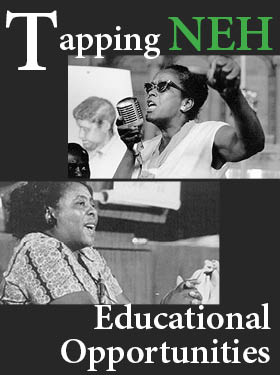Recently, I participated in a three-week summer institute that extensively examined the Civil Rights Movement, specifically, the importance and complexities of the Mississippi Narrative within this social movement. Entitled, "Mississippi in the National Civil Rights Narrative," this institute was sponsored in concert by the Council of Federated Organizations, the Fannie Lou Hamer Foundation, and the National Endowment for the Humanities. To provide necessary context, the institute succinctly traced American history from the Trans-Atlantic Slave Trade through the Brown vs. Board of Education decision. Using 1954 as the outset of the Civil Rights Movement, prominent veteran activists, along with authors, researchers, and scholars highlighted multiple essential narratives that centered the Mississippi Narrative as necessary to a comprehensive understanding of the Civil Rights and Black Power Movements.
Lead scholar Dr. Leslie McLemore, an original delegate of the 1964 Mississippi Freedom Democratic Party (MFDP) to The Democratic National Convention, along with faculty from Jackson State University and Tougaloo College, led participants on a tour of several historic locations. For example, participants visited the home of Medgar Evers, the National Civil Rights Museum in Memphis, Fannie Lou Hamer’s home in Ruleville, Mississippi, and Money, Mississippi, the site of Emmitt Till’s murder. Each venue allowed participants to absorb the layered nuances of historical narratives told by authentic civil rights authorities, which enhanced this educational experience and reinforced the institution's goals. By the close of the institute, presenters and participants engaged in continuous stimulating discussions and scholarly debates while creating practical tools for classroom instruction that emphasized the importance of Mississippi’s saga in the larger Civil Rights Movement.
In contemporary educational settings, specifically higher education, this kind of "hands-on" training in the humanities seems limited and scattered compared to that in the science, technology, engineering, and math fields. However, the National Endowment of the Humanities (NEH) consistently grants awards that strengthen teaching by offering research opportunities that allow access to cultural and educational resources not readily found in mainstream academia. For example, each summer the NEH conducts institutes (such as the one described above), seminars, and workshops designed to enhance educators’ abilities to create provocative lessons that challenge students to ascertain critical information. The NEH partners with a myriad of organizations to reach a diverse pool of educators. One such organization, The Community College Humanities Association, maintains a long and prolific marriage with the NEH, delivering meaningful and pragmatic education experiences.
In sum, the future of education will find necessity and value in critical thinking and effective communication skills as they relate to the importance of historical accuracy and oral records. Proficiency in framing scholarly discussions that cultivate free and rational thinking promises to link students to the essential abilities mandated for success in a global workforce. The National Endowment of the Humanities and the Community College Humanities Association offer unique educational experiences for faculty and students to explore careers as authors, educators, researchers, and scholars. As a former NEH Fellow, I highly recommend participation in NEH Institutes and Seminars as a means of advancing one's scholarly interests and creative activities. The NEH provides wonderful opportunities to connect with prominent and diverse scholar-practitioners.
